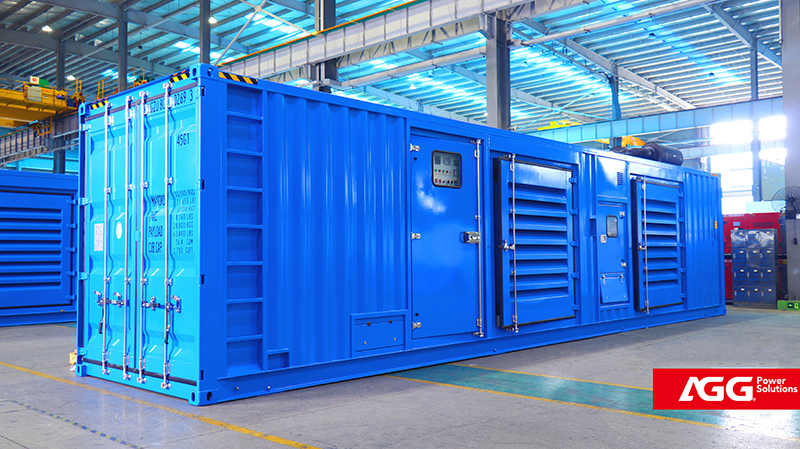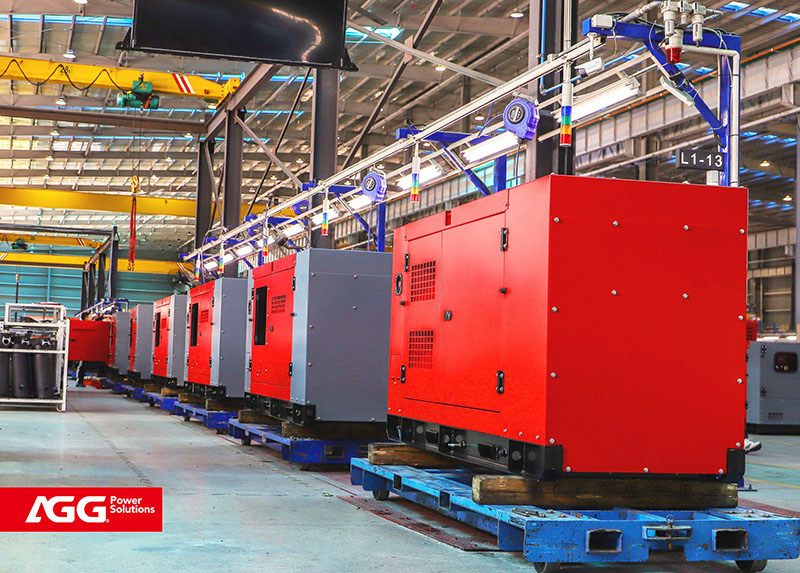When choosing between gas and diesel generators, the cost of operation depends not only on the price tag of the fuel, but is also affected by the price and efficiency of the fuel, maintenance needs, engine life, site conditions, emission regulations, and how the generator is used. In this article, AGG will analyze these factors that need to be considered to help you use them as a reference when choosing the right generators for your project.
Fuel cost and efficiency
Fuel prices are the most obvious operating cost. In some markets, natural gas or LPG can be cheaper per kWh than diesel, especially in areas where piped gas is available on a large scale. Gas engines can also run efficiently to handle steady, prolonged loads - especially in modern, well-tuned generator sets.

However, diesel engines typically have higher fuel densities and achieve higher thermal efficiencies under heavy loads, making them more economical for applications with high loads or in remote areas where fuel delivery is tighter. Volatility in the global oil market also makes the price of diesel more unpredictable than local natural gas supplies in some areas.
Maintenance and lifecycle costs
Maintenance frequency and repair costs can also have a large impact on operating costs. Diesel generator sets are robust, have durability in harsh environments, can withstand higher load variations, and are easier to refuel in remote areas. This means predictable maintenance schedules and a long service life.
Gas generator set typically do not require frequent oil changes and run cleaner internally, but their fuel and control systems can be more complex (especially dual-fuel or LPG engines), which can increase parts and technician costs in some areas. The cost of personnel and transportation while the equipment is in operation should be included in the total operating costs.
Emissions, regulations, and site constraints
Emissions regulations and permits can affect operating costs. Compared to older diesel generator sets, gas generator sets typically emit lower levels of particulate matter and NOx, which can reduce the need for costly after-treatment systems or emissions offsets in regulated areas. In urban or sensitive areas, lower emissions can translate into lower compliance costs and fewer operating restrictions - an indirect but tangible operating cost savings.
Conversely, if the use of diesel as a fuel requires strict adherence to emissions standards, this could increase initial and maintenance costs and could tip the economic balance in favor of natural gas, where regulations are more favorable.
Fuel availability and logistics
Operational reliability depends on the ease of fuel supply. For facilities along natural gas pipelines, gas generator sets are not only convenient, but are often cheaper to transport. For remote areas, islands or temporary sites without access to piped natural gas, the portability and well-established supply chain make diesel a practical and sometimes more economical option, despite its higher cost per liter.
Load profile and application suitability
Generator sets need to be matched to the load. For continuous and predictable base loads (e.g., large factories, data centers with on-site gas supply), gas generator sets appear cost-effective. For standby applications with frequent starts/stops, high transient loads, or that must operate under variable conditions, diesel's ruggedness and quick-start capability can reduce the risk of downtime - an important economic factor when power outages are costly.

Why choose AGG?
AGG offers a range of gas and diesel generator sets designed to meet real-world project requirements. AGG gas generator sets are designed for high-efficiency, low-emission operation, especially where pipeline or liquefied petroleum gas (LPG) supply is feasible, while AGG diesel generator sets are proven for rugged, remote and heavy-duty applications. With AGG's global service network and project expertise, customers receive the most appropriate technical guidance rather than one-size-fits-all advice.
There’s no universal answer: gas generators can be cheaper to operate when local gas prices, regulatory advantages, and steady load profiles align. Diesel generators may be more economical for remote, high-load, or highly variable applications where fuel logistics and engine robustness matter most. The best choice is project-specific — and AGG’s portfolio and expertise are designed to help you arrive at that decision with a full view of both immediate and long-term operating costs.
For tailored advice on which AGG genset fits your project, contact AGG’s technical team to run a comparative total-cost analysis.
Know more about AGG here: https://www.aggpower.com/
Email AGG for professional power support: [email protected]
Post time: Oct-17-2025

 China
China
